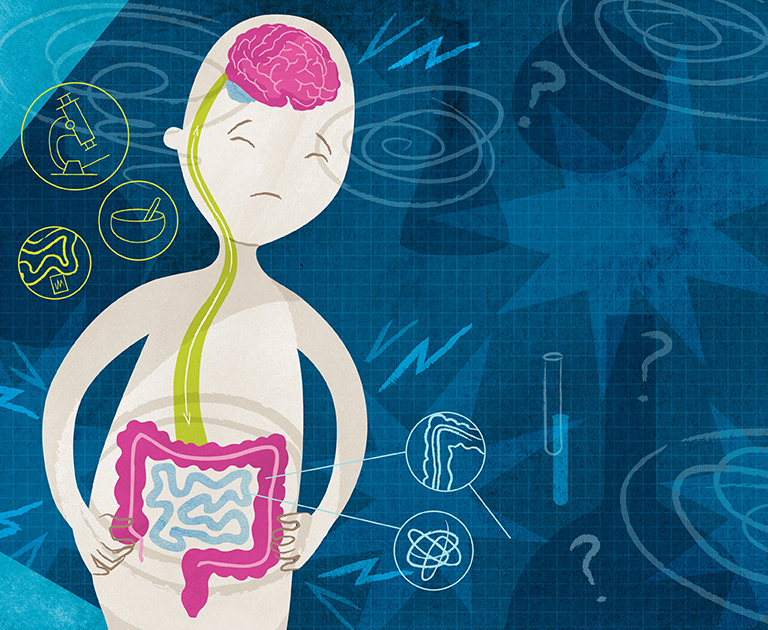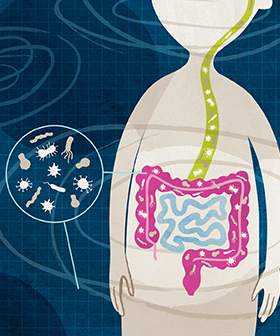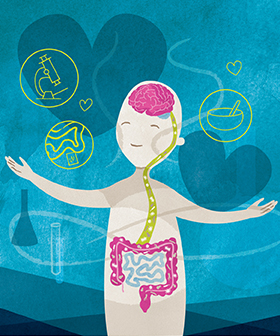More than a gut feeling
 Researchers are racing to understand how the microscopic bacteria in our gut could tackle big health challenges.
Researchers are racing to understand how the microscopic bacteria in our gut could tackle big health challenges.
The gut boasts an impressive résumé when it comes to a child’s overall health. Aside from its main job of processing food, it impacts virtually everything we do. It acts like a second brain and influences how we behave. It serves as a training ground for our immune system. And it even determines our susceptibility to developing other diseases.
“The gut truly is an extraordinary organ,” said Dr. Bruce Vallance, an investigator at BC Children’s Hospital. “As we’ve started to discover over the years, there are numerous links between the gut and many other aspects of our health.”
To gain a clearer understanding of these connections, leading gastroenterology researchers at BC Children’s have directed their attention to something that weighs only a few pounds: the gut microbiome. Part of the digestive tract, it teems with a diverse community of some 100 trillion tiny “creatures,” called microbes. While bacteria make up the majority of microbes, it’s also home to various species of viruses and fungi.
Most of these residents are good for our health. But not all of them. In some children, dangerous microbes lurk in the gut, waiting to expand inside the intestine under the right conditions to cause inflammation.

IT STARTS WITH THE GUT
When the gut microbiome is disrupted, it can have a ripple effect on myriad aspects of children’s health. In other words, what happens in the depths of the gut doesn’t always stay there. In recent years, gastrointestinal researchers at BC Children’s have made massive strides in understanding these implications.
They have a secret weapon in this work: a microbiome profiling core facility, called Gut4Health. Located on the hospital’s campus, the state-of-the-art space was made possible through the visionary support of Mining for Miracles.
Here’s a snapshot of this work.
UNDERSTANDING THE GUT-BRAIN AXIS
The gut is commonly called the body’s “second brain.” While many of us don’t realize it, it boasts its own independent nervous system—the enteric nervous system (ENS)—which is home to some 100 million nerve cells. Through the body’s information superhighway, the vagus nerve, the ENS in our gut is in constant communication with the central nervous system in the brain.
Given this, it might not come as a huge surprise that the gut microbiome influences a child’s mood and behaviour. It explains why they may feel butterflies in their stomach, for instance.
Yet, what has been a striking discovery in recent years is the mounting evidence showing the gut’s impact on serious mental health conditions. For example, BC Children’s researchers have found that anxiety and/or depression occur in at least one-quarter to one-third of kids with inflammatory bowel disease (IBD). Further research has also revealed a connection between gut microbes and autism spectrum disorder.
This knowledge has the power to transform how clinicians treat mental health conditions, since identifying the microbes, or their products, which influence mental health could lead to the development of new microbiota-targeting drugs that combat anxiety or depression.
STOPPING CHILDHOOD ALLERGIES FROM STARTING
Across Canada, one in every three children suffer from allergies.
Researchers at BC Children’s are at the global forefront of understanding why this is happening—and even more importantly, how to stop it. The answer, they believe, could also be found in the gut microbiome.
In a nearly decade-long study, Dr. Stuart Turvey, a pediatric immunologist at BC Children’s, has been exploring how the bacteria that live inside a baby early in life are important for educating the immune system. A recent breakthrough revealed that all forms of childhood allergic disease—eczema, asthma, food allergy and hay fever—link back to the gut. Kids who are at high risk of these conditions appear to have a delayed maturation of their gut bacteria.
These findings stress the importance of a diverse microbiome, which comes from encouraging kids to interact with their environment. It could also open the door to new therapies that can change these bacterial interactions— and potentially even prevent allergic disease entirely.
“Developing therapies that change these interactions during infancy may therefore prevent the development of all sorts of allergic diseases in childhood, which often last a lifetime,” Dr. Turvey said.
ELIMINATING INCURABLE GASTROINTESTINAL ILLNESSES
A more obvious area influenced by the gut microbiome are gastrointestinal illnesses. Across Canada, cases of these conditions are rising at an alarming rate among children—including IBD, which consists of Crohn’s disease and ulcerative colitis. Although experts are still determining how, it’s clear that the gut microbiome plays a crucial role in this disease, which causes inflammation that can lead to severe stomach pain, diarrhea and weight loss.
Currently, IBD is managed using a number of different anti-inflammatory therapies. To determine which one is most effective for a child, clinicians must take a trial-and-error approach. This means kids may endure significant side effects, only to learn that a therapy isn’t effective in quelling their symptoms.
“We don’t know at the outset who is going to respond to one therapy or another,” said Dr. Kevan Jacobson, a pediatric gastroenterologist at BC Children’s Hospital. “If the first therapy you start with doesn’t work, you go to the next one. Or you may start with one therapy, and it works—but a child could lose response to it over time.”
REPLICATING THE GUT MICROBIOME, ON A CHIP
The path forward to treating some of the toughest illnesses could lie in the gut microbiome. The challenge is that it has long been one of the least-understood aspects of the human body. That’s in large part because of the difficulties in mimicking it outside of the body, as well as the uniqueness of each child’s microbiome.
That’s starting to change. Gastrointestinal specialists believe a novel technology may hold the answer. It’s called gut-on-a-chip, and it allows researchers to create tiny replicas of a patient’s intestine in the lab, known as organoids. They can then add bacteria and other microbes or various dietary components to the organoids to gain a clearer picture of what’s happening in the microbiome. And perhaps most excitingly, it can serve as a testbed to see how a child might respond to tailored therapies for different conditions, such as IBD.
“We’re getting as close to what’s going on in the gut as we’ve ever been able to,” said Dr. Vallance. “This work is allowing us to figure out why kids are sick, what the disease has done to their intestine and how we can fix it more precisely.”
DETERMINANTS OF MICROBIOME HEALTH
In addition to medication, a range of other factors can shape a child’s gut microbiome. Diet is one of them. In her lab, Dr. Genelle Lunken, an investigator at BC Children’s, is working to explore the role that personalized nutrition plays in improving outcomes for children with gut-related conditions, including IBD.
To do that, she’s developing an in vitro microbiome system that mimics the oxygen-free environment in the gut using a patient’s stool sample. Different foods can then be added to the system to see how their microbiome responds.
“If we can use the gut microbiome to predict responses to diet in a laboratory setting, we can then develop effective dietary plans that can be provided to patients in clinics,” said Dr. Lunken. “This would allow us to move closer towards personalized dietary approaches for our patients, helping to improve overall health and wellbeing.”
In addition to this, Dr. Jacobson is exploring the importance of environmental determinants, including pesticide application and poor air quality, in affecting the health of the microbiome. A recent study determined that population-level exposure to petroleum oil used on orchards and grapes was associated with an elevated risk of IBD. Exposure to greater amounts of fine particulate matter air pollution (the tiny droplets found in smoke and produced by cars) was also found to be a contributing factor in altering the health of the intestinal microbiome.
Putting all the factors together will allow clinicians to study the importance of their relationships and better inform them as to what therapy to choose—and for which patient and at what time.

THE NEXT FRONTIER
Although many questions remain when it comes to the gut, one thing is certain: its job goes well beyond aiding digestion. Propelled by cutting-edge technologies, brilliant minds and an incredible community of donors, BC Children’s is at the verge of astonishing breakthroughs in understanding the gut.
Already, the gut microbiome is showing tremendous promise in conquering mental health conditions, preventing allergic diseases and determining a child’s susceptibility to cancer—and that’s all the more reason to be gutsy about diving deeper into this work.
